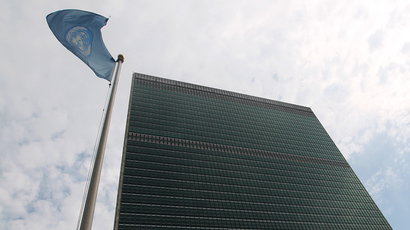Congress leaders getting ready to approve Syria strike
Obama’s battle to get congressional approval for a military strike on Syria moved a step closer Tuesday, with leaders of both parties in Congress announcing that the United States should respond to Syrian President Assad’s alleged use of chemical weapons.
US President Barack Obama convinced leaders of both Democrats and
Republicans in Congress to support his request for the
authorization of a military strike on Syria. After a meeting with
more than a dozen senior lawmakers this week, members of both
parties went public, praising Obama's plan and pledging a 'yes'
vote on the operation against the Syrian government.
The Senate Foreign Relations Committee is set to vote Wednesday on a draft resolution for authorizing use of military force in Syria. The draft resolution would set a 60-day deadline for action, with one 30-day extension possible, while barring ground forces.
The resolution was crafted by Sens. Robert Menendez (D-N.J.) and
Bob Corker (R-Tenn.), the chairman and ranking member of the
committee. Any final Senate resolution would eventually need 60
votes to overcome a filibuster by opponents.
Meanwhile, members of the House of Representatives released two separate draft resolutions on potential US military action in Syria, Politico reported.
Rep. Devin Nunes (Calif.), a top Republican on the House Intelligence Committee, offered a resolution calling for President Obama to consult with Congress within 60 days to provide information on nine fronts to justify the use of military force.
The other resolution, offered by Democrats Rep. Gerry Connolly
(Va.) and Rep. Chris Van Hollen (Md.), is also supportive of a
Syria attack but seeks to narrow the scope of any such action.
Their resolution bars use of ground forces, limits attacks to 60
days while prohibiting a second series of attacks -- unless the
Obama administration has proof Assad used chemical weapons again
-- and says an attack on Syria can only happen to prevent use,
not stockpiling, of chemical weapons.
Rep. John Boehner (R-Ohio), the speaker of the House of Representative, told reporters after a White House meeting on Tuesday that he thinks it’s important that Americans to unite behind their president.
“This is something that the United States, as a country, needs to do. I'm going to support the president's call for action. I believe that my colleagues should support this call for action," he said.
House Democratic Leader Nancy Pelosi and House Majority Leader Eric Cantor also said that they will both support actions against the Assad government following meetings at the White House.
Obama had been meeting more than a dozen lawmakers in the White House cabinet room to push for limited strikes to dismantle Assad’s ability to use chemical weapons in the future. The president said he is confident he can persuade a skeptical American public that a strike Syria will not emulate the wars in Afghanistan or Iraq, and that US military action will be a “limited, proportionate step.”

Boehner said that only the US has the capability to stop Assad.
“We have enemies around the world that need to understand we’re not going to tolerate this type of behavior. We also have allies around the world and allies in the region who also need to know that America will be there and stand up when it’s necessary,” he said.
Boehner’s views were echoed by Rep. Eliot Engel of New York, the top Democrat to attend the White House meeting from the House Foreign Affairs Committee.
“We are talking about weapons of mass destruction. This is war crime. If we didn’t respond in kind it would send a message to every despot, every thug, every dictator, every terrorist group in the world that you can murder your own citizens with impunity and nothing is going to happen,” Engel said.
But after over a decade of war in Iraq and Afghanistan, the polls show that Americans are opposed to any new overseas military intervention. This reluctance is reflected by senators and representatives who believe Obama still hasn’t produced concrete evidence that it was Assad who used chemical weapons on August 21 or why it is in America's interest to intervene.
Rep. Justin Amash (R-Michigan) tweeted that he has been talking to his constituents and armed forces personnel, neither of whom have the stomach for military action in Syria.
I've been hearing a lot from members of our Armed Forces. The message I consistently hear: Please vote no on military action against #Syria.
— Justin Amash (@repjustinamash) August 31, 2013
"I've been hearing a lot from members of our Armed Forces," Amash tweeted this week. "The message I consistently hear: Please vote no on military action against Syria."
Rep. Rick Nolan (D-Minnesota) also said that he would strongly oppose any military action.
“I am vehemently opposed to a military strike that would clearly be an act of war against Syria, especially under such tragic yet confusing circumstances as to who is responsible for the use of chemical weapons,” he said.
Skepticism is shared by many tea party Republicans and others on the right and left who oppose military intervention for ideological reason and for specific reasons on authorizing the use of force without constraints on timing, costs and the scope of any attack.
Senator Rand Paul (R-Kentucky) also said he would vote against resolution.
“Who is on America’s side over there? If the rebels win, will they be American allies? Assad’s definitely not. I’m not convinced anybody on the Islamic side will be American allies,” he said.
He also warned that it wouldn’t be helpful to amend any resolution that constrains Obama too much to execute military action, something that some lawmakers are calling for.
Obama has said he is open to other proposals to address lawmakers concerns but has said he wants a prompt vote.
“So long as we are accomplishing what needs to be accomplished, which is to send a clear message to Assad, to degrade his capabilities to use chemical weapons, not just now but also in the future, as long as the authorization allows us to do that, I'm confident that we're going to be able to come up with something that hits that mark," Obama said.
During a hearing on Capitol Hill on Tuesday afternoon, Secretary of State John Kerry advocated for re-writing Obama’s authorization to use military force in order to clear up any language that would leave open the possibility for putting US boots on the ground.
“There will not be American boots on the ground with respect to the civil war,” Kerry insisted. At the same time, however, the former senator fell short of insuring Congress that US troops may not be asked to intervene on mainland Syria in the future if, for example, chemical weapons fall into the hands of extremists “and it was clearly in the interest of our allies” to recover weapons of mass destruction.

Kerry, along with Gen. Dempsey and Defense Secretary Chuck Hagel, made up a three-witness panel of Obama administration officials who answered questions Tuesday before the Senate Foreign Relations Committee. All three men advocated for a limited strike on Syria as proposed by the president.
“We cannot overlook the impact of chemical weapons and the danger that they pose to a particularly volatile area of the world in which we’ve been deeply invested in years,” Sec. Kerry told the lawmakers. “We cannot be silent,” he added.
Dempsey, the chairman of the JCOS, called the alleged use of chemical weapons by Assad’s regime an “assault on humanity” and “a serious threat to America’s national security interests.”
“Our allies throughout the world must be assured that the US will fulfill its security commitments,” he said. “The US must demonstrate through our actions that the use of chemical weapons is unacceptable.”
Should the US not act, added Kerry, America’s allies may suspend their support of the White House’s initiatives in the future.
“As we convene for this debate, it’s not an exaggeration to say to you, all of you, my former colleagues, that the world is watching not just to see what we decide, but it’s watching to see how we make this decision,” Kerry said during his statement. “Whether in a dangerous world we can still make our government speak with one voice. They want to know if America will rise to this moment and make a difference.”














